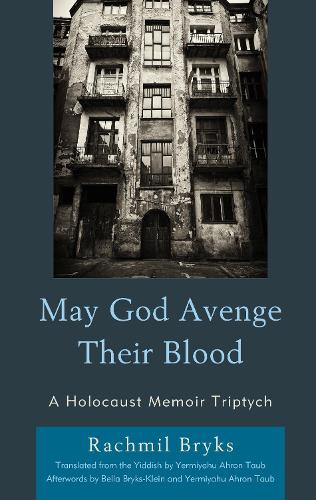
May God Avenge Their Blood: A Holocaust Memoir Triptych
(Hardback)
Available Formats
Publishing Details
May God Avenge Their Blood: A Holocaust Memoir Triptych
By (Author) Rachmil Bryks
Translated by Yermiyahu Ahron Taub
Afterword by Bella Bryks-Klein
Afterword by Yermiyahu Ahron Taub
Bloomsbury Publishing PLC
Lexington Books
20th May 2020
United States
Classifications
Professional and Scholarly
Non Fiction
History of religion
Memoirs
The Holocaust
Autobiography: historical, political and military
940.5318092
Physical Properties
Hardback
272
Width 161mm, Height 231mm, Spine 23mm
612g
Description
May God Avenge Their Blood: a Holocaust Memoir Triptych presents three memoirs by the Yiddish writer Rachmil Bryks (19121974). In "Those Who Didn't Survive," Bryks portrays inter-war life in his shtetl Skarysko-Kamienna, Poland with great flair and rich anthropological detail, rendering a haunting collective portrait of an annihilated community. "The Fugitives" vividly charts the confusion and terror of the early days of World War II in the industrial city of d and elsewhere. In the final memoir, "From Agony to Life," Bryks tells of his imprisonment in Auschwitz and other camps. Taken together, the triptych takes the reader on a wide-ranging journey from Hasidic life before the Holocaust to the chaos of the early days of war and then to the horrors of Nazi captivity. This translation by Yermiyahu Ahron Taub brings the extraordinary memoirs of an important Yiddish writer to English-language readers for the first time.
Reviews
...For the many readers who have never heard of Bryk, I beseech you to get this volume. You are likely tofeel as I do, that here is a rare thing, a genuine writer who is ours, writes in Yiddish, although the material belongs to all humanity.
Read the full review here: https: //digitalcommons.georgefox.edu/cgi/viewcontent.cgiarticle=2233&context=ree
--Brian Horowitz, Tulane University "Occasional Papers on Religion in Eastern Europe"Bryks, the author of this Holocaust memoir, was among the most important writers in Yiddish literature. This is the first English translation of his travails as a prisoner of the Nazis, from his time in the Lodz ghetto from 1940 to 1944, to his subsequent deportation to Auschwitz and his later imprisonment in other concentration camps. A writer in the humanistic tradition, Bryks's tribulation under the Nazis reveals a writer focused on the humanity of his fellow prisoners and the evil he encountered among his captors. The triptych memoir is written in almost documentary prose, first detailing his life in the Polish shtetl Skarysko-Kamienna, where he describes the folkways and traditions of an orthodox Jewish community that the Nazis would soon destroy. Thrust into the Lodz ghetto in May 1940, the author and his fellow Jews faced uncertainty, confusion, and physical hardship. In recounting his incarceration in Auschwitz, Bryks is relentless in his descriptions of mass starvation, illness, and the fear of imminent death, but also of moments of connection and courage amid these extreme conditions. Following his liberation, Bryks found his way to the US, where he raised a family and continued to publish his poems and other works in Yiddish. The memoir also includes an invaluable glossary. Summing Up: Highly recommended. General readers, graduate students, faculty, and professionals.
-- "Choice Reviews"Highly recommended!
-- "Association of Jewish Libraries Reviews"These memoirs comprise a significant addition to the first-person accounts of the Holocaust available in English, particularly in their depiction of the very early and late stages of the war. Bryks's sharply observed characters and narrative drive, enhanced by Taub's fluid translation and helpful notes, make the text compelling and accessible for students and the general public. Each of the three sections reflects a distinct aspect of the Holocaust and could be assigned independently, enhancing the volume's utility in teaching. At the same time, the appendices and afterwords provide background on Bryks's life and work and thus enhance its value as a resource for scholars. One may hope that this book will inspire further translations from the voluminous Holocaust literature in Yiddish that remains largely unknown, and for which this excellent volume can serve as a model.
-- "Holocaust and Genocide Studies"Translator Yermiyahu Ahron Taub has crafted an English version of Bryks' work which flows seamlessly and at the same time preserves the stylistic nuances of Bryks' unique prose. Thoroughly useful is the glossary of personalities mentioned in the text. In the epilogue, the reader is also privy to an affectionate personal portrait of Rachmil Bryks, written by his daughter, Bella Bryks-Klein. Indeed, this new edition is a respectful tribute to a remarkable man and important Yiddish writer who himself embodied the destroyed civilization of Polish Jewry.
-- "Forward"May God Avenge Their Blood isn't the same as other Holocaust memoirs. Rachmil Bryks describes his experiences in the camps but also offers an evocative description of the Jewish community destroyed by the Nazis. Bryks' warm portrayal of Jewish life in Skarysko-Kamienna reveals a society rich in tradition while in the midst of significant change. Tales of Talmud study stand alongside stories of elopement and entrepreneurship. Bryks' depiction of the first weeks of the war, the second and longest section of this triptych, is unforgettable. Notably, Bryks describes everyone he encounters--Jews, Poles, Germans, peasants, writers, and others--with a deep empathy. May God Avenge Their Blood is perhaps most useful for anyone interested in interpersonal relations. Bryks's stories often confirm the deep antisemitism among many Poles but they also show many examples of human kindness. Bryks offers no analysis or final judgements, simply a description of what happened. Taub's achievement as a translator is more
than the rendering of a text into a language more of us understand; it is an offering of a neglected source as a guide to a tragic past.--Sean Martin, Western Reserve Historical Society, Cleveland, Ohio
Author Bio
Rachmil Bryks was author of seven Yiddish-language books and contributed extensively to the Yiddish press.
Yermiyahu Ahron Taub is the recipient of the 2012 Yiddish Book Center Translation Prize and the 2014-2017 Modern Language Associations Fenia and Yaakov Leviant Memorial Prize in Yiddish Studies for Oedipus in Brooklyn and Other Stories by Blume Lempel (2016).
